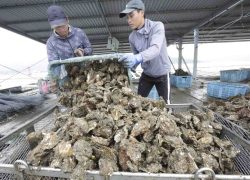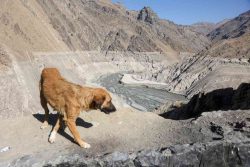
A wild howler monkey is seen in the branches of a tree in Comalcalco, Tabasco State, Mexico, on May 20.
12:45 JST, May 30, 2024
COMALCALCO, Mexico (AFP-Jiji) — Volunteers are rushing to hoist food and water up into trees in sweltering southern Mexico, but help came too late for the howler monkeys whose lifeless bodies lay still on the ground.
Dozens of the primates are reported to have dropped dead from trees in recent weeks, alarming conservationists trying to keep the monkeys hydrated during a heat wave.
Victor Morato and his team at a veterinary hospital in the town of Comalcalco in Tabasco state have treated eight howler monkeys brought in by residents.
“When they arrived here in agony, they extended their hand to us as if to say ‘help me.’ I had a lump in my throat,” he told AFP.
Several monkeys arrived at the clinic with body temperatures of around 43 C, Morato said.
When they faint from the heat they sometimes fall 20 meters, he added.
It is all the more worrying since the Mexican howler (Alouatta palliata mexicana) and the Yucatan black howler (Alouatta pigra) are considered endangered by the International Union for Conservation of Nature.
The mantled howler (Alouatta palliata), which also lives in southern Mexico as well as Central and South America, is classified as vulnerable on the Red List of Threatened Species.
Authorities investigate
Leonardo Sanchez was among those putting out water and fruit to help the animals on a cocoa plantation in the southern state of Tabasco.
The thermometer has reached almost 50 C in recent weeks, the 22-year-old biology student said.
“We’ve had a large number of deaths [of monkeys] due to the increased temperatures,” he said.
Some volunteers carried lime to sprinkle on the bodies of dead primates.
Mexico’s President Andres Manuel Lopez Obrador, who hails from Tabasco, said on May 20 the heat was the worst he had known.
“Since I’ve been visiting these states I’ve never felt it as much as I do now,” he said at his regular news conference.
Mexico’s environment ministry has said that it is investigating whether extreme heat was killing the monkeys, with studies under way to rule out a virus or disease.
Causes under consideration included heat stroke, dehydration, malnutrition or fumigation of crops with pesticides, it said.
In Tabasco, a vulture lingered and flies swarmed near a grave that volunteer Bersabeth Ricardez said contained the bodies of around 30 monkeys.
“Today it’s the monkeys. Tomorrow it will be us,” she said.
Top Articles in Science & Nature
-

Japan Institute to Use Domestic Commercial Optical Lattice Clock to Set Japan Standard Time
-

iPS Treatments Pass Key Milestone, but Broader Applications Far from Guaranteed
-

Record 700 Startups to Gather at SusHi Tech Tokyo in April; Event Will Center on Themes Like Artificial Intelligence and Robotics
-

iPS Cell Products for Parkinson’s, Heart Disease OK’d for Commercialization by Japan Health Ministry Panel
-

Japan to Ban Use of Power Banks on Airplanes
JN ACCESS RANKING
-

Japan PM Takaichi’s Cabinet Resigns en Masse
-

Japan Institute to Use Domestic Commercial Optical Lattice Clock to Set Japan Standard Time
-

Israeli Ambassador to Japan Speaks about Japan’s Role in the Reconstruction of Gaza
-

Man Infected with Measles Reportedly Dined at Restaurant in Tokyo Station
-

Videos Plagiarized, Reposted with False Subtitles Claiming ‘Ryukyu Belongs to China’; Anti-China False Information Also Posted in Japan






















